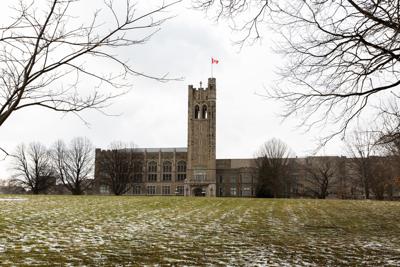
The USC recently approved its new Environmental Sustainability Policy Paper, which seeks to make recommendations to Western administration and students to improve campus’ environmental footprint.
The University Students’ Council president Zamir Fakirani and vice-president external affairs Eunice Oladejo headed the paper, saying it provides guidance for the USC’s long-term sustainability and advocacy goals.
“So far, the USC has not been able to synthesize these voices or produce recommendations on what Western, the city and government stakeholders can do,” said the USC in a statement. The policy paper seeks to solve this with “tangible, evidence-based solutions to the ongoing climate crisis.”
The sustainability paper has four main themes: increasing transparency, improving accountability regarding Western University’s environmental sustainability progress, developing an equitable and intersectional approach that involves Indigenous voices and providing students with opportunities to get involved.
The paper makes multiple recommendations to increase transparency in Western’s approach to environmental sustainability, including advocating for university investment frameworks that “include meaningful targets for reductions in carbon intensity.”
Fakirani believes Western’s environmental efforts must be public and readily available for students since they are “either not aware” of the university’s current actions or they “are not easily accessible.”
The paper also recommends Western to “implement enforcement mechanisms that address reporting standards and adherence to the policy” so accountability can be maintained.
“This work cannot be done in silos, we must work together as this issue affects everyone,” wrote the USC. “Relying solely on university-facing recommendations would leave gaps in our policy and shift accountability away from stakeholders such as the provincial and municipal governments who have equally important roles to play in addressing the ongoing climate crisis.”
Western has adopted an approach to environmental sustainability that has allowed for greater involvement of the Indigenous community in London. The Indigenous Food and Medicine Garden is one such an example. The aim is to “foster a welcoming and inclusive community on-campus and promote Indigenous presence, Indigenous Knowledge exchange and community involvement.” This inclusion is reflected in the USC policy paper’s recommendations as well.
“Indigenous voices and youth voices have been at the forefront of the environmental movement for generations,” wrote Fakirani in a statement. The ESPP presents recommendations to help strengthen Indigenous and student voices on campus through student involvement in the maintenance of “campus ecosystems and green spaces” and consultation “with Indigenous groups and communities to prioritize Indigenous stewardship of the land.”
Fakirani hopes the policy paper will encourage administrative staff and students to take action and improve Western’s environmental footprint.







(0) comments
Welcome to the discussion.
Log In
Post a comment as Guest